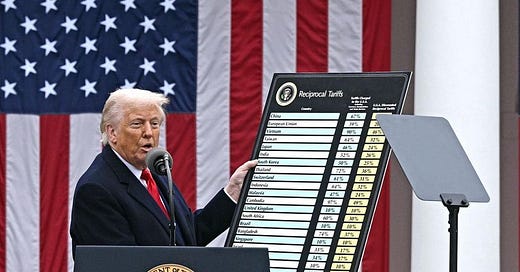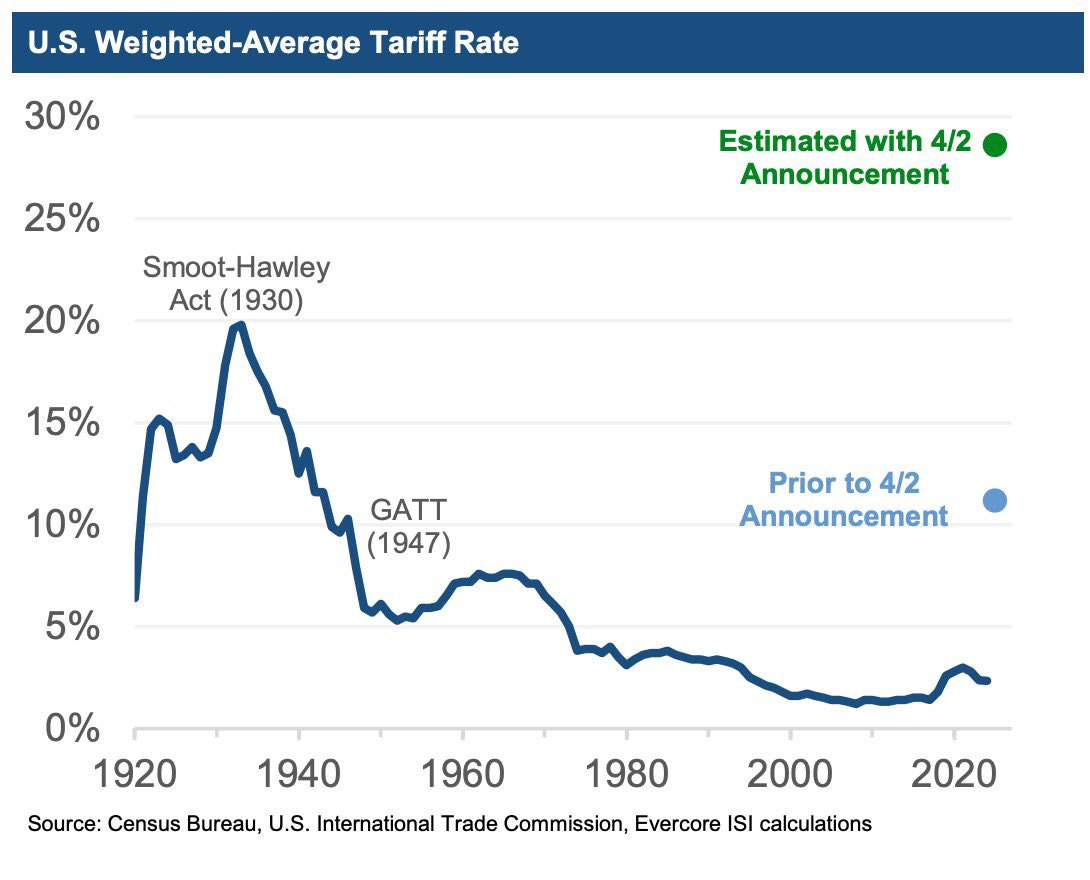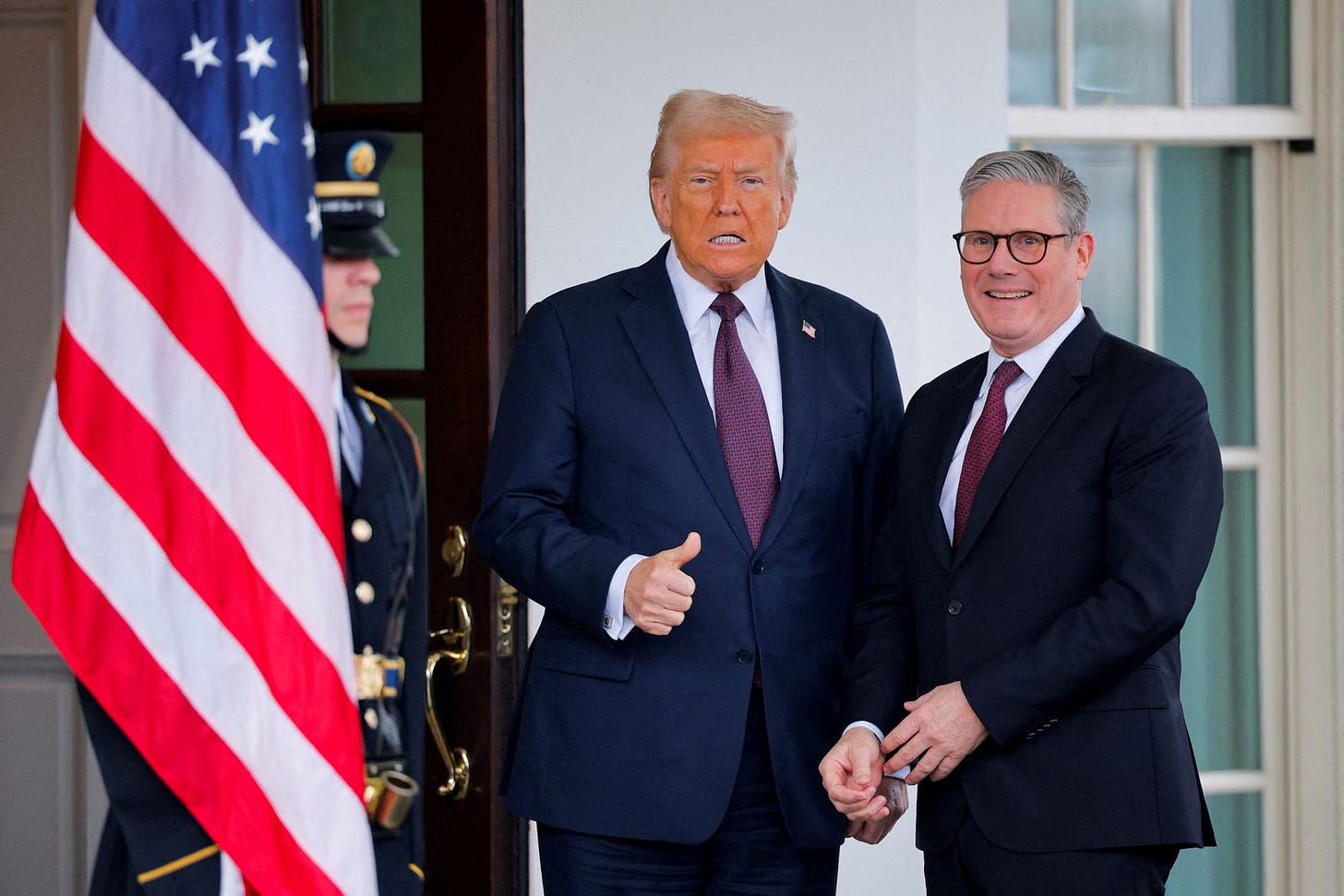No, Britain has not escaped lightly from Trump's tariffs
And it is not a very convincing vindication of Brexit.
Typically, economic shocks are, well shocking. They emerge as a surprise- a war, a natural disaster, a pandemic, a stock market crash. They are rarely predicted, predictable and self-imposed. Economic theory and reason would suggest that individuals and nations will utility-maximise, they will always try and make themselves richer in all circumstances. As ever, Donald Trump proves the exception to the rule. What the Trump administration has done overnight is to (in effect) impose economic sanctions on their own country.
There are few (if any precedents for the introduction of such significant trade barriers, imposed so quickly. To take a longer view, if Trump follows through and sustains the tariffs, then 2nd April (“our economic Independence Day”) will mark the end of an eight decade trend towards freer trade in the United States and to a greater or lesser extent, around the world. From the GATT agreement onwards, through the Bretton Woods era and beyond, it was the US that led the way in removing barrier barriers and towards trade simplification. It reaped the benefits, in that the US shaped the economic order in its own image, gained access to lucrative foreign markets and cemented the dollar as the world’s pre-eminent and reserve currency. Trump is sending a signal that that long march is over and on paper we’re about to return to tariffs which were in excess of those seen in the Great Depression. It is yet another re-ordering in which Trump seems to specialise.
That is not to say there weren’t costs to the US of the older order and Trump’s analysis is completely empty. The President is right that the US economy was sometimes more open to the world than the other way around, especially in emerging markets. In the heyday of globalisation, successive administrations put too much faith in the power of the free market and competitive pressures to replace jobs lost in traditional manufacturing sectors and industrial regions, with devastating consequences for many families. That insouciance has led us to the political moment where we are today. Trump is also right that some economic players, especially China, have rigged the game in their own favour and been far more strategic in the protection of their own key industries. But that is only a shade of the story, and Trump’s message of economic pillage and “rape” is simplistic in the extreme. America gained more than it lost through free trade. The absence of protectionism solidified America’s position as an economic superpower and drove down prices for US consumers. US companies became dominant across the globe. Competitive pressures spurred innovation. America became and remained an economic hegemon because of the old order, not in spite of it. Trump’s read ignores all of that. It is also curiously insensitive to the immediate pressures of his own politics. The President was elected largely on a mandate to lower prices. Instead he has just imposed what is a de facto sales tax across the US economy, for no short term gain. If nothing else, it is…courageous and (for Trump) unusually dogmatic and ideological. He seems to really believe in tariffs transformative power to both reorder the American economy and provide a permanent source of new revenues, which will allow him to lessen direct taxation. There is little evidence for either proposition.
There is read across through Trump’s approach to economics and geopolitics. Both rest on an assumption that the United States is so powerful and so dominant that it will be largely immune from the consequences of Trump’s own policy actions. On geopolitics, Trump believes that it is largely immaterial that he unpicks decades’ worth of alliances and alienates America’s friends, America is big enough to operate without the sentiment of its old friends. He believes that America’s base hard power has been under-utilised by successive US presidents. Likewise, Trump’s zero sum game analysis is that America has underused its raw economic strength and leverage, which he is now unlockinG. He believes the US can weather any economic shocks from tariffs and become more autarchical, produce what it needs itself. It’s a huge economic experiment and a gamble. As with political leadership, America’s erstwhile allies will start to unpick their relationship with the old superpower and try and forge new partnerships. In the long term, we might even see yesterday not so much as America’s Independence Day but as a day when its Western economic leadership came to an end.
But this is speculation- we can’t know for sure how this will play out for the US. It is true that its continental sized economy and reserve currency might insulate it from some of the worst effects. But what we can be sure of is that that is certainly not true of the relative economic minnow that is the UK. Not that you’d know it from the way these tariffs have been covered in a fair bit of the UK press. Downing Street was quick to spin that Trump’s application of a 10% tariff on the UK was a minor triumph for Britain and a vindication of Starmer’s softly softly strategy in dealing with Trump. The Telegraph and even Politco cited the relatively lower tariffs for the UK vs the EU as a Brexit benefit. Many broadcasters said the same.
This is pretty risible parochialism. Let’s look at the facts.
A 10% tariff is still very significant and will be damaging to a whole suite of UK industries. That’s what we've got for endless diplomatic effort and hugging Trump as closely as possible, irrespective of what he does or says.
Many of these same pundits and papers conveniently fail to mention that it’s not just the UK which has received the 10% rate. Other countries to do so include Brazil, Turkey, Argentina, El Salvador, Peru to name just a few. Viewed through that prism, it is hardly a vindication of the “special relationship”. That’s the despite the fact that the UK is one of the few countries with which the US enjoys a healthy balance of trade.
The UK’s most valuable export to the US is cars. Those will still have a tariff of 25% imposed, which will be highly damaging to the UK auto sector. That’s in addition to more substantial tariffs which are already in place on UK steel and aluminium, two struggling industries.
There is also the clear danger of the dumping of goods which would have headed to the US flooding UK markets.
And crucially, even if a 10% is relatively positive, it ignores the far bigger problem. One way or another, if these tariffs sustain, they will create a major shock to the world economy. We can’t know for sure how severe it will be, just because tariffs were a major contributor to the depression of the 1930s, we can’t be certain they will have such a significant effect today. But there will clearly be economic dislocation and lost growth around the world. That will affect the UK even if we secure a trade deal with the US and the elimination of these tariffs altogether. The world is economically interdependent, whether Trump or we like it or not. In other words, if there is a slowdown in the EU and in the US that washes up on us, making a precarious economic and fiscal situation worse still.
Which brings us to the other delusion which abounds in much of the press and a fair section of the commentariat this morning- the self-congratulation that Britain is finally realising a substantial Brexit benefit in avoiding an extra 10% to which the EU is subjected.
I can understand this impulse to clutch at straws, but I am afraid it is largely just that. Let us consider the logic of that statement. It is posited that it is a vindication of Brexit that we have avoided an additional 10%. That is true, if we were still in the EU we’d be looking at 20% with no obvious means of securing a deal to ensure its reduction, which we now enjoy. But so what? For the reasons I’ve outlined above, 10% is bad enough. But looking at this moment as a Brexit benefit ignores the endless economic disbenefit that we’ve endured since 2016 and ignores the far bigger picture. Our currency remains devalued. UK goods exports to the EU have declined, with some studies showing a 27% drop in exports and a 32% drop in imports between 2021 and 2023 compared to a scenario without Brexit. Services have been less affected, showing more resilience to deal with the exigencies of the TCA but every study would suggest they are lower than they would have been without the years of uncertainty Brexit caused. Overall, the OBR has said that the UK economy will be 4% smaller than it would have been without Brexit, our trade intensity with the EU will be 15% down on where it would have been in the medium term and the overall economic damage will be comparable to the damage created by Covid. Compared to all of that, the 10% Trump tariff differential is a rounding error. It is like giving £100 to Peter, receiving £20 from Paul and congratulating oneself on a job well done.
And perhaps that wouldn’t have been so much of a problem if one of the central economic premises of Brexit- that we would secure new trade deals around the world- had been realised. But we haven’t signed many and most we have are rollovers with deals we had before. Certainly we’ve secured nothing which begins to replicate the economic relationship we had with the EU. Tariffs with the US are especially relevant here because we were also told repeatedly that a trade deal with the US would be one of the main prizes of an independent trade policy. Not only do we still not have that, nearly a decade on from 2016, but we actually facing additional tariffs from the US instead. Even if we do secure a trade deal in the coming weeks, it will be partial and weighted in the US' favour.
Brexiters told us that plucky Britain could lead the way in an era of free trade, instead we have headed into a world of protectionism where Britain’s modest economic weight counts for little. Many of the same people who slammed Obama for telling us we'd be "back of the queue" for a trade deal are many of the same people who are today telling us that it's a triumph for Britain that Trump has imposed only a 10% tariff rate on British goods. The truth is that the post-Brexit settlement has rarely seemed more exposed: we have neither the security nor the power of being in a large trade bloc, nor a truly special relationship with the world’s remaining economic superpower and insufficient economic power to matter much on our own. Far from a moment of triumph, today should be clarifying for our true status in this world new order, one which we have partly imposed on ourselves. But few in Britain will dare to say it aloud.








Well said, Lewis, inescapable facts. You were a welcome voice on Newsnight last night btw.
On a happier note - we never need to hear the words ‘Special Relationship’ again.